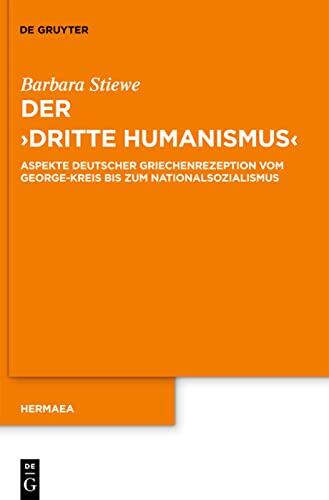
Der ""Dritte Humanismus"": Aspekte deutscher Griechenrezeption vom George-Kreis bis zum Nationalsozialismus
przez
Barbara Stiewe
Brak ocen
History
Format
Twarda okładka
Strony
338
Język
Niemiecki
Opublikowany
Apr 19, 2011
Wydawca
De Gruyter
Wydanie
1
ISBN-10
3110235617
ISBN-13
9783110235616
Opis
In this insightful examination, the author delves into the multifaceted relationship between German culture and Greek antiquity, tracing the influence of classical thought from the George Circle through the tumultuous period of National Socialism. The exploration highlights how these classical ideals were reinterpreted and recontextualized by various intellectuals, showcasing the complex interplay between nationalism and humanism.
Through meticulous research, the work reveals how figures within the George Circle embraced Greek culture as a means to foster a distinct national identity, drawing upon classical themes to articulate their vision for Germany’s future. Stiewe highlights the challenges and transformations within this movement as societal and political landscapes shifted, particularly during the rise of the Nazi regime, which sought to appropriate these ideals for its own agenda.
The narrative uncovers the tensions inherent in the reception of Greek thought, particularly how its philosophical underpinnings were used to both unite and divide. By examining the nuances of this period, the author sheds light on the significant impact of Greek literature, philosophy, and aesthetics on German thought.
Finally, the book serves as a crucial reflection on how cultural heritage can be reshaped by prevailing ideologies, urging readers to consider the implications of such transformations in the context of modern interpretations of humanism and national identity.
Through meticulous research, the work reveals how figures within the George Circle embraced Greek culture as a means to foster a distinct national identity, drawing upon classical themes to articulate their vision for Germany’s future. Stiewe highlights the challenges and transformations within this movement as societal and political landscapes shifted, particularly during the rise of the Nazi regime, which sought to appropriate these ideals for its own agenda.
The narrative uncovers the tensions inherent in the reception of Greek thought, particularly how its philosophical underpinnings were used to both unite and divide. By examining the nuances of this period, the author sheds light on the significant impact of Greek literature, philosophy, and aesthetics on German thought.
Finally, the book serves as a crucial reflection on how cultural heritage can be reshaped by prevailing ideologies, urging readers to consider the implications of such transformations in the context of modern interpretations of humanism and national identity.
Recenzje
Nie ma jeszcze recenzji
Bądź pierwszy, aby zrecenzować tę książkę i podziel się swoimi przemyśleniami
Dodaj pierwszą recenzjęDziennik czytania
Nie znaleziono dzienników czytania
Zacznij śledzić swój postęp w czytaniu, aby zobaczyć logi tutaj
Dodaj swój pierwszy dziennik czytaniaNotatki
Dziennik transakcji
Nie znaleziono dzienników transakcji
Zacznij śledzić swoje transakcje książkowe, aby zobaczyć logi tutaj
Dodaj swój pierwszy dziennik transakcji